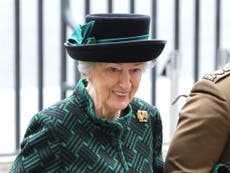Is anyone really surprised by racist remarks at the palace?
What Lady Susan Hussey said to Ngozi Fulani didn’t shock me – it reeks of the institution’s supremacy and privilege


Your support helps us to tell the story
From reproductive rights to climate change to Big Tech, The Independent is on the ground when the story is developing. Whether it's investigating the financials of Elon Musk's pro-Trump PAC or producing our latest documentary, 'The A Word', which shines a light on the American women fighting for reproductive rights, we know how important it is to parse out the facts from the messaging.
At such a critical moment in US history, we need reporters on the ground. Your donation allows us to keep sending journalists to speak to both sides of the story.
The Independent is trusted by Americans across the entire political spectrum. And unlike many other quality news outlets, we choose not to lock Americans out of our reporting and analysis with paywalls. We believe quality journalism should be available to everyone, paid for by those who can afford it.
Your support makes all the difference.I’m not sure what it’s going to take for the royal family to confront and address its racism. Or if, indeed, that is even possible when it is founded on structures of supremacy and privilege.
We know that Meghan Markle, the Duchess of Sussex, was widely vilified and ridiculed by parts of the UK press after publicly speaking out about her experiences during that famous Oprah interview last March.
But today marks the first time in recent years that a palace staff member has left their role over racism allegations.
Lady Susan Hussey, the late Queen’s lady-in-waiting, resigned after it emerged that she made “unacceptable and deeply regrettable comments” to Ngozi Fulani, a prominent Black advocate for survivors of domestic abuse. Ngozi is the CEO of Sistah Space, the UK’s leading domestic abuse charity supporting Black women.
Hussey, Ngozi told The Independent, interrogated her about where she “really came from” and dismissed her right to be British while touching her hair without consent (which is a violation). “This is bigger than one individual,” she told me. “It’s institutional racism.”
A spokesperson for Prince William released a statement criticising the behaviour of Lady Hussey, who is the future king’s godmother, saying “racism has no place in society”. But there was no comment on what steps would be taken to fight it.
To my mind, what happened to Ngozi is racial abuse, plain and simple. Abuse that was perpetrated in a crowded, high-society room, in broad daylight. So, what happens behind closed doors?
It’s precisely this stinking attitude that inspires hostile environment policies that sparked the Windrush scandal. It’s the stuff of far-right loons and rabid racists. And it has, understandably, left Ngozi shaken by the ordeal.
As I type, the great unhinged are combing through her Twitter feed – lest we forget, Ngozi is the victim in all of this – trying to find reasons to justify the treatment that was meted out to her. This is England, beloved.
Though abhorrent, Lady Hussey’s remarks are unsurprising – as is the palace’s inadequate response to them. It reeks of the institution’s supremacy and privilege that has allowed discriminatory policies to thrive in the highest echelons of our country, unchecked, for centuries.
It is worth remembering that the royal household is currently exempt from equalities legislation and had banned the hiring Black people up until at least the 1960s.
Now, the royals have had a tumultuous few years – from Harry and Meghan publicly speaking out about racism at the heart of the establishment, to backlash over Prince William’s blaming of African overpopulation for environmental challenges; and the refusal to publish Kensington Palace’s diversity data last year. Eventually, Buckingham Palace was forced to take the unprecedented step of doing so, revealing dismal numbers.
Just days ago, the royals were slammed for their failure to condemn Angela Levin, British royal commentator and biographer, over an offensive tweet about Meghan’s skin colour and association with anti-Meghan Twitter accounts.
Queen Consort Camilla caught some heat over her “awkward” interactions with Black children while visiting an east London charity last week.
And you can add to this the “tone deaf” royal Caribbean tours, earlier this year – which met with calls for slavery reparation for the atrocities carried out in their family name. From Belize, the Bahamas and Jamaica; to Antigua and Barbuda, Saint Lucia and Saint Vincent and the Grenadines, the royals were consistently confronted with choruses for compensation and faced with the painful legacy of colonialism which underpins their privilege. They were reminded, at every turn, that they had – in effect – stepped into a crime scene.
And, of course, King Charles editing Britain’s only Black newspaper last month, while seemingly ignoring the racial abuse meted out to his own daughter-in-law and failing to directly address reparatory justice in his editor’s letter, served to insult many conscious-minded Black Britons.
People like Ngozi, myself – and millions of others who are descendants of African people enslaved in the name of the royal family – are all-too conscious of the history of this establishment. In light of this, the palace is actually lucky she attended in the first place.
Before Ngozi went to the palace, she told me of the “auction block” moment she had whereby she reflected upon the institution as a whole.
“[I was aware that] The place itself does not reflect us,” she said. “I’m very aware of the history of these spaces. I’m also very aware of the conversation around racism in the royal family, I’m very well aware of it. But my role was to represent Sistah Space and to promote the 16 days of activism.”
Buckingham Palace said it took the incident with Ngozi, at the Queen Consort’s reception on violence against women on Tuesday, “extremely seriously” and had investigated immediately.
But, at the time that this statement was released, Ngozi told me that she hadn’t heard from the palace nor received an apology. Clearly, she was not directly privy to the process or outcome of the investigation, either.
For the avoidance of doubt: allowing Lady Hussey to resign, muttering hollow apologies and effectively writing this off as an isolated incident would be a total cop-out from the palace where inequalities are baked into its very core.
Without following up this scandal with meaningful reflection, engagement and changes, they’re at risk of missing another opportunity to learn while further alienating swathes of the country.
Ngozi has dedicated her life to anti-racist activism and, specifically, protecting women who are affected by domestic abuse. That she would be invited to the palace in supposed recognition of this work, then subjected to racial violence, has a twisted irony.
To keep up to speed with all the latest opinions and comment sign up to our free weekly Voices Dispatches newsletter by clicking here
Now, campaigners have called for an independent review of racism at the palace, and for the royals to face up to the racism within the household. This includes organisations like Republic.
Political leader Mandu Reid, of the Women’s Equality Party, who witnessed the exchange between Lady Hussey and Ngozi, has called for a “culture change” within the monarchy.
Is that likely? We’ll see.




Join our commenting forum
Join thought-provoking conversations, follow other Independent readers and see their replies
Comments